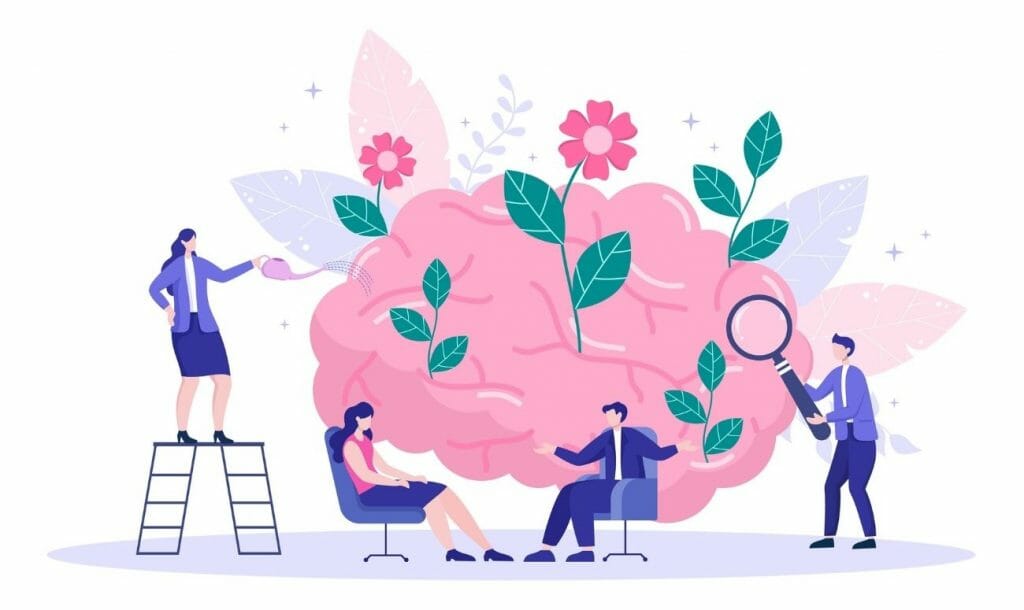As per National Mental Health Survey 2015-16, nearly 15% of adults in India suffer from one or more mental health disorders. Numbers depict that 1 in 20 people are depressed while 1 in 40 have experienced some form of depression in the past. The term ‘mental health’ reflects our state of well-being in which we realize our own potential, can cope with the normal stresses of life, can work productively and fruitfully, and are able to make a contribution to our community. Lately, more and more people are realising the importance of mental health and mindfulness in all aspects of life but especially at the workplace.
Experiencing sadness, mood swings, anxiety, and stress at workplace is a common and normal part of life but sometimes there are events or situations that deeply impact our mental wellbeing, in turn affecting our productivity and performance at work. Similarly, sometimes, unhealthy or uncompassionate work environments can have a major impact on our mental health. To understand how poor mental health in the workplace can have negative repercussions on businesses, we spoke to Seema Rekha, Managing Director of Antarmanh Consulting, a global wellness partner for transforming organizations through people enhancement. With an expert team of management consultants, organizational development consultants, organizational psychologists, clinical psychologists, business coaches, life coaches, and more, they equip businesses and companies with wellness solutions, skills, and strategies to achieve organizational goals within a framework of trust and inclusivity.
In addition, the Covid-19 pandemic shed major light on why mental health matters in the workplace. In this exclusive interview, Seema Rekha shares how a well-designed workplace structure is essential to support individual mental health to then in turn encourage reduced absenteeism, increased employee engagement, and group productivity.
ThinkRight.me: From IIM to TISS, you have had quite a journey before founding Antarmanh. Tell us more about it. What made you choose this sector?
Seema Rekha: Working in the sector of management consulting for several years has been a very gratifying and enriching experience. However, in my early working years I sensed everyone around me, brilliant at work with just the right pedigree struggling with dissatisfaction and lack of clarity. I also saw mental health services were not structured and were limited to hospital and clinical set up, which was catering to serious issues & had a reactive approach.
That’s where I started thinking about the essential need of creating awareness on Mental Health at the workplace because, when I took a look at my loved ones’ working experiences, I realized that all kinds of workplaces had certain gaps in terms of culture and environment, which if filled would lead to enhanced working conditions for all.

Hence, the field of organizational psychology intrigued me into researching what really accounts for high levels of OHI (Organizational Health Index) that cater to the well-being of both the workforce and the organization itself. I expanded my orientation to studying both the aforementioned as dynamic beings. Thereafter the foundation of Antarmanh was laid with the understanding that human beings thrive in a culture of support and inclusivity and an organization that caters to the well-being of its workforce is sustainable and well-performing.
TRM: What missions and objectives did you have in mind while setting up Antarmanh? How has your experience been since the inception of the company, especially with the global pandemic turning our lives haywire?
Seema Rekha: The primary objective of starting Antarmanh was to pave the way for the creation of a healthier and happier global community. We extended our support to less fortunate populations through various NGOs & Schools. Conducting many outreach programs. We believe in an atmosphere of mutual respect and trust that can facilitate capability development in the real world. Thereon, we understand that with the right skillset, people can be turned into the most important resource that an organization has.
Our experience in the field has been very fruitful and we’re witnessing a transformation in the organizational set ups that truly understand the relevance of workplace wellness solutions. While working with key industries, we’ve walked a long way from identifying several roadblocks to catering to the same and fostering a cohesive culture of collaboration. The results have always been rewarding.
The pandemic has altogether reinforced the need to reconsider well-being at the workplace. We can no longer turn a blind eye to the workforce in terms of their health, job satisfaction and emotional well-being, because the times have reiterated its impact on the organization’s overall growth and performance. This is resulting in a greater demand for well-being solutions at the workplace as it has proved to be a worthwhile investment.
TRM: During the pandemic, the importance of discussing and normalizing mental health at the workplace was much highlighted. What are some of the risky workplace factors that can negatively affect the mental health of the employees?
Seema Rekha: The importance of initiating conversations regarding employees’ holistic well-being is quintessential and the pandemic has only highlighted it further. Considering that we spend a majority of our time at our workplaces, its impact on the different domains of one’s life is understandable. Hence, a culture that promotes competition over collaboration would create friction amongst key players in the organization. And thereby, leaders lose the opportunity to foster the idea of belongingness. Similarly, a lack of empathy and communication would make it difficult for the employees to face adversities and solve business problems together. Overall, it’s the environment at a workplace that either nurtures productivity or hampers it.
TRM: Can you suggest a few techniques and methods organizations can adopt to promote mental health in the workplace?
Seema Rekha: Well-being at the workplace is multi-faceted and a global concept. It caters to the physical, emotional and social health of an individual. Our top-down approach first assesses the working culture to identify the gaps. The primary steps in incorporating it are about advocacy wherein conversations about the same are facilitated and the leaders set examples for the workforce by exhibiting empathy and understanding. Thereon, an open culture of collaboration can be fostered where everyone feels safe and included while they work. The focus is on creating a cohesive environment that feels supportive.

Furthermore, an organization can lookout for the following:
- Ensuring leaders’ well-being
- Investing in preventive measures to avoid escalations
- Training employees in their honeymoon period
- Promoting diversity and inclusion
- Building a resilient workforce
- Creating an emotionally safe workplace
TRM: Talk to us about the scale of Antarmanh’s disruption of the wellness industry and some of the reasons for this success? How do you plan to revolutionize the Indian market?
Seema Rekha: When most organizations think of employee well-being, it is thought of in terms of its cost and is considered as a solution that can be used as and when problems arise. However, we believe that this is an investment and that problems wouldn’t arise where a cohesive workforce has already been established. This re-pays the organization in multifold ways, it helps in decreasing the attrition rates, ensures employees’ commitment and productivity, decreases the chances of team conflicts and unhealthy competition, fosters a collaborative spirit and overall enhances the business performance. Since we’re investing in organizational culture, it is a year-round commitment that serves as a foundation for all business activities. The conclusive results of this investment exhibit our success. We’ve seen tremendous transformation in our clients’ performance.
TRM: You lead a successful company that has experienced steady growth in a short time. Looking back, what do you say to yourself, and what drives you to continue striving for new milestones?
Seema Rekha: 3 Ps:
- Positivity
- Persistence
- People centric approach
Helping others and empowering people acts as a motivating factor for me regardless of whether it is a friend, relative, colleague or even a stranger. There are times when the people around you need that extra drive to get going in life, and I tend to relish the opportunity to reach out to such people. It gives me a sense of immense confidence and belief that I can be of some help and lend my support to them. The idea that I might provide a solution to someone’s problem is what keeps me going at all times. To understand and empathize with people is crucial. You do not want to make them feel inferior or incapable of solving their own problems. I try to find ways to show them an alternate and less resistant path as a solution to their difficulty and inspire them to move towards the direction of being resilient. This not only makes them feel better but also allows them to introspect and to think logically. I am highly positive which further makes me want to instill the same optimism onto others when they need it the most. Lending a helping hand is about making the person feel upbeat, energetic and positive.
TRM: With significant years of industry experience, according to you, what skills or characteristics make someone a seasoned and impactful leader?
Seema Rekha: Visualize a bus that has a driver seat at the back. You can ensure direction and care for passengers (team members) simultaneously. Be a conscious leader, don’t always lead from front. Once you create a team, ensure operational excellence in place with almost zero response time and then try to incorporate some of the following:
- Leading from the back , like a wolf pack
- Flexibility in approaches
- Problem solving attitude
- Prompt decision making ability
- Empathy, empathy & empathy

TRM: Looking beyond the post-pandemic era, how do you plan to grow Antarmanh and what do you want the business to look like five years from now?
Seema Rekha: Antarmanh’s strength is its wellness centric business intelligence. We wish to be a global leader and synonym for people wellness at the workplace. We’ve established ourselves in the Indian market as the preferred choice for wellness solutions across industries such as IT, engineering and content moderation. Next, we intend on expanding massively on a global level as providers of management consulting with a focus on ensuring emotional well-being.
TRM: And lastly, being a successful entrepreneur must be such a stressful and chaotic process, can you share with our readers a few mindfulness tips that you consciously practice daily to find balance within?
Seema Rekha: As a leader, it is imperative to take care of one’s own wellbeing so as to ensure smooth operations and growth. I believe in connecting with my team as and when I’m able to. We share a safe and supportive space where we respect and celebrate our uniqueness. This connection has enabled us to avoid many conflicts and has facilitated swift decision making on the professional front. Over the course, we’ve also realized that establishing a one to one connection with everyone is quite rewarding and helps in alleviating everyone’s stress levels. I view this networking as a very valuable resource in planning and expanding business activities.
Apart from this, I also engage in conscious and mindful leadership which keeps me on the track and guides my professional journey. It helps me to have a holistic vision towards work and thereon I work in a bottom-up approach, catering to everything in parts in an organized and a systemic way.
Personally, I prefer to work steadily towards finding the most effective solutions. I’ve found meditation to be a great tool that helps in keeping me centered and calm. It is very important to be focused amidst the hustle of attending endless meetings with numerous individuals, practicing meditation reminds me of what’s important and aligns my actions with my vision.
About Ms Seema Rekha:
Ms. Seema Rekha is a gentle humanitarian by heart and a passionate leader. She has been zealously working for a decade with her partners from varied backgrounds such as government, health, lifestyle, pharmaceuticals, information technology, etc. in the arena of emotional wellbeing.
She is a successful, female entrepreneur who has taken Antarmanh’s services to 13 countries in a span of 2 years. The globally operational organization is bootstrapped since 2013, and is credited with delivering mental health services in diverse socio-cultural communities.
These positive affirmations can help you achieve work-life balance.
Read more: How To Cope With Summer Colds
Like & Follow ThinkRight.me on Facebook, Instagram, Twitter and Telegram to stay connected.






























